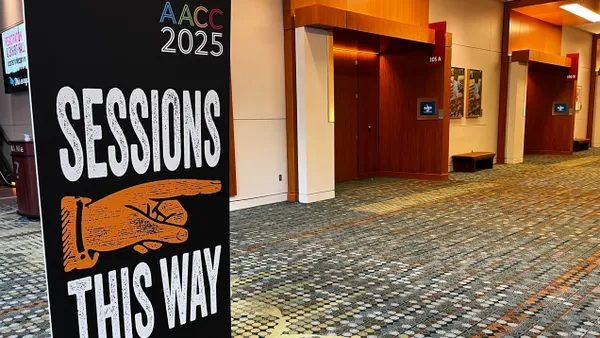Dive Brief:
- New research offers early evidence that short-term, nondegree certificates and other credentials can have a positive impact on an individual's economic mobility, according to a report released today by Strada Education Network and the Lumina Foundation based on self-reported data.
- Adults with a certificate or certification but no degree are employed full time at a higher rate (85%) than those with no credentials (78%). The former also reported higher annual median income ($45,000) than the latter ($30,000). The report is based on responses from 50,000 people between age 25 and 64 that are in the labor force, don't have a college degree and aren't enrolled in college.
- Nondegree credentials tend to deliver the largest earnings boost for workers in fields such as security/protective services, architecture and engineering, and construction; they have the least benefit for individuals in education and administrative positions. Men and women benefited roughly the same from nondegree credentials in terms of full-time employment, though the resulting income premium was "considerably larger" for men.
Dive Insight:
Respondents with nondegree credentials said they are more likely to recommend them to others, and a majority (60%) said they believe the educational experience will bring employers value, compared with 44% of noncredential holders who said the same.
Strada and Lumina have both been strong advocates of expanding the credential marketplace, in some cases by studying the practice of letting students embed industry credentials in their degree programs.
At the end of last year, there were roughly 650,000 unique traditional degrees, certificates and other programs available in the U.S. In a survey of 190 two- and four-year, public and private colleges, 94% of institutions said they offer alternative credentials.
Certificates are far more common than badges, according to the survey, though both tend to be used in the same fields: business, education, technology, professional and business services, and health care. About one in five institutions offers badges, with private institutions the least likely (9% of respondents) and baccalaureate colleges the most (26%). That's in addition to alternative education providers like coding boot camps, which also offer short-term, nondegree credentials like badges.
However, industry observers widely agree that the marketplace for such credentials is fragmented and inconsistent.
Efforts to address that include news in March that Credential Engine, which has created a national registry for credentials, and six credential providers were teaming up to translate their program data into a common language that can make it easier for students, employers and educators to understand and compare their value.
Meanwhile, another group of institutions, including Harvard University, the Massachusetts Institute of Technology and the University of California, Berkeley, is exploring ways for students to securely own and share their full range of credentials and work experience.
One option could be a digital diploma or transcript that is hosted on the blockchain — something institutions such as MIT and Central New Mexico Community College have offered.













